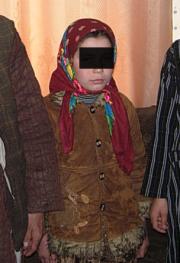KABUL - Ten-year-old Sweeta still remembers the most painful moments of her life when a bulky 35-year-old man raped her in his office in the town of Sheberghan, Jowzjan Province, in northern Afghanistan.

IRIN News, June 16, 2008: "The three men in the car grabbed her and drove to an army barracks where the commander raped her in his office. She [Sweeta] was threatened that if she told anyone about the incident they would kill her parents." (Photo: AHRO)
Lal Gul Lal, chairman of AHRO, speaking about Sweeta, 10 (pictured)
At around 10am on 31 January 2008 a vehicle with the markings and number plate of the Afghan National Army (ANA) stopped near a water-point where Sweeta was filling her buckets, according to the Afghanistan Human Right Organisation (AHRO).
“The three men in the car grabbed her and drove to an army barracks where the commander raped her in his office,” said Lal Gul Lal, chairman of AHRO, who has provided legal support to the victim’s family.
The child was semi-conscious when the rapist dropped her home with some gifts, lying to her elder sister that she was hit by a car and was experiencing abdominal bleeding.
“She [Sweeta] was threatened that if she told anyone about the incident they would kill her parents,” Lal told IRIN in Kabul.
But it soon became clear that the girl had been raped, and this was later confirmed by local doctors.
For a whole week after the incident Sweeta’s father knocked on various government doors, trying to obtain justice, but only received verbal sympathy.
The situation changed when he approached AHRO and local and national media got wind of the story. Despite strong opposition from some influential figures, the rapist was arrested and brought to court in Kabul.
“Many cases are unreported”
Sweeta’s is not an isolated case: Some children are exploited for sexual purposes but their misery is rarely talked about in public.
“Many cases are unreported,” said Hangama Anwary, a commissioner for the rights of children with the Afghanistan Independent Human Rights Commission (AIHRC).
At least 31 cases of child sexual abuse were registered by the AIHRC in 2007. So far this year only four cases have been reported, though it is estimated by the AIHRC and other human rights organisations, that there are hundreds of cases every year.
“Some parents think by reporting sex offences against their children they will only bring dishonour on their families,” Anwary said.
On 19 September 2007 seven young men gang-raped and tortured a 13-year-old girl in the northern province of Balkh, according to the two rights watchdogs, the AHRO and the AIHRC.
“A government official released all the accused rapists two days after they were apprehended, saying there was a lack of evidence,” said Lal of AHRO.
“The offenders are still at large and the victim is roaming around various government departments with her petition for justice,” he added.
According to Lal, many of those involved in sex offences are able to escape justice due to the weak rule of law and corruption among judges and government officials, and/or have the support of powerful militia leaders.
Link with human trafficking
However, some measures to tackle sexual offences against children have been taken: On 6 June a court in Takhar Province reportedly sentenced to death a man accused of raping and strangling to death a seven-year-old girl.
In early May, judges in Kandahar Province gave the death penalty to a man who reportedly raped and buried a six-year-old girl.
“Afghanistan is a source, transit, and destination country for men, women, and children trafficked for the purposes of commercial sexual exploitation and involuntary servitude,” found the 2007 Trafficking in Persons Report of the US Department of State.
The report said Afghan children were trafficked internally and to regional countries for “commercial sexual exploitation, forced marriage to settle debts or disputes, forced begging, debt bondage [and] service as child soldiers”.
The AIHRC also said there were strong linkages between human trafficking and child sexual abuse. However, a major obstacle in tackling child trafficking is the lack of specific legal and judicial tools.
“Human trafficking has not been defined in our legal system so far,” the AIHRC’s Hangama Anawary told IRIN. “We also do not have legal clarity on issues related to child sexual abuse.”
Rights watchdogs have repeatedly called on the Afghan government to immediately enact a comprehensive anti-trafficking law and increase law enforcement efforts against human trafficking, particularly the trafficking of children.
No victim support
Although the man who raped Sweeta in Sheberghan has been sentenced to 15 years by a court in Kabul, her post-trauma suffering has not diminished - neither the government nor the rapist have paid any financial compensation to ease the victim family’s difficulties, and Sweeta has not received any rehabilitative and/or mental support to help her return to a normal life.
“The government does not run a formal victim support fund to assist victims like Sweeta,” Lal Gul Lal said.
Afghanistan’s legal system envisions individual compensatory mechanisms in which only offenders - not the government - must pay financial compensation to victims.



